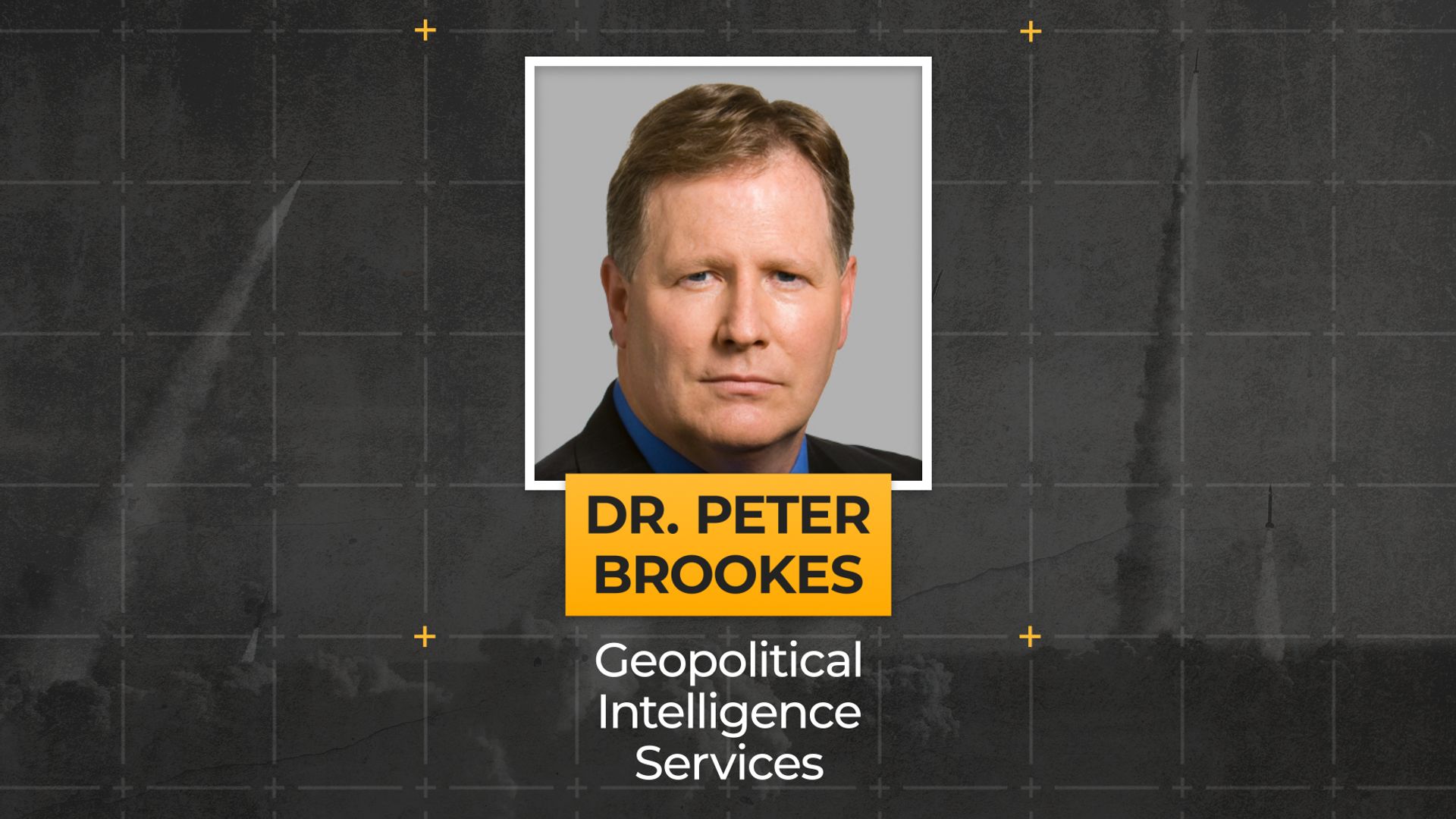
Ryan Robertson: Peter, thank you so much for joining us today. You are a hard man to get a hold of, but I really want to talk to you about an article you had written for GIS, about Iran’s nuclear ambitions. You had some kind of key takeaways in there, but I want to start off with this idea of breakout time. What exactly you mean by breakout time?
Dr. Peter Brookes: Well, I’m not a nuclear physicist, but I think that that term is often used inappropriately, people use it a lot. What it really means is the time it would take a country to produce enough physical material for one bomb. So it’s not the time it would take for them to produce the bomb itself, but the time to produce the physical material.
The building of a bomb itself is a whole other scientific and engineering challenge.
Ryan Robertson: And right now, Iran’s breakout time to get that fissile material is pretty short.
Dr. Peter Brookes: Yes, under the Joint Comprehensive Plan of Action from 2015, the agreement with the P5+1 to five permanent nuclear powers plus Germany/EU and Iran was—
Ryan Robertson: Real quick, the Iran nuclear deal, as it’s commonly called?
Dr. Peter Brookes: Yes, exactly. The Iran nuclear deal, as it’s commonly called. They envisioned that it would take at that point, you know, 2015, they envisioned that it would take a year for Iran to be able to produce enough fissile material for one bomb.
Recently, the International Atomic Energy Agency (IAEA), the U.N.’s nuclear watchdog, which monitors this agreement, says that it could only be a couple of weeks that Iran could have enough stockpiled low-enriched uranium, that in a couple of weeks, it could produce enough high-enriched uranium to produce at least one bomb.
Ryan Robertson: Nuclear-armed Iran. Not good for the Middle East, not good for the world.
Dr. Peter Brookes: Now, not at all. We don’t want to see another country join the once-exclusive nuclear club. There’s a lot of reasons to be concerned about Iran. They want hegemony over the Persian Gulf, they want hegemony in the Middle East. They have serious issues with the United States and Israel, as we know, they have a tremendous amount of animus towards the United States and Israel. They also are a radical regime that supports terrorism.
One of the big concerns is, in the context of Russia and Ukraine, Russia has nuclear weapons and Ukraine doesn’t.
Russia may have more freedom of action because of concerns of escalation from the conventional scale to the nuclear scale. So a radical Islamist regime that supports terrorism with nuclear weapons, and has great power aspirations is, in my estimation, not a good thing. Nobody wants it — well, many people do not want Iran to get the bomb. I’m not sure who does, although they do have some relationships with some other rogue states. But certainly the United States does not want to see Iran get the bomb.
Ryan Robertson: Does Iran need to use ICBM or missile to be able to deliver a nuclear device if they have these terrorist proxies that can, dirty bomb, you know, backpack nuke kind of thing? Right?
Dr. Peter Brookes: Well, first of all, it’s important to know that we’re not quite clear as to whether Iran has the technology or capability to build the bomb.
They’re working on the material that’s required. And then there’s a whole other set of scientific and engineering challenges that are required to actually make that warhead, right. Even if they had an underground test, which they’ve tested nothing so far, and they might try to use supercomputers to say, “We have the capability of doing it.” We’re not sure that they actually have a warhead.
So then once you once you do this thing underground, you do this testing underground, then you have to miniaturize that engineering rig to be able to put it in the nose cone of a missile or something else.
A nuke backpack is something that was talked about during the Cold War, that takes a tremendous amount of science and technology. Just getting it down to fit in the nose cone of an ICBM, which can carry a lot of weight is a real challenge.
A dirty bomb is not a nuclear weapon, per se. There’s no fission or fusion in that, it just spreads radioactive materials. So it’s important to clarify those things. But yes, ultimately, Iran down the road could certainly put a nuclear weapon in a ship sailing into a harbor, right? They could they could put it on an aircraft, remember, that’s how they started with with us was aircraft. They could put it on a missile at some point in different size range, once they’re able to create that sort of a warhead.
They also could put it on a drone, or a cruise missile. Remember, Iran is a major supplier of drones and a major leading drone power in the world today. And they’re providing them to Russia, and they’ll be used for both ISR intelligence, surveillance and reconnaissance as well as weapons delivery.
Right now, there’s a concern that Iran is sharing its weaponry with its allies and proxies in the Middle East, and some of them are terrorist groups. So yes, Iran is the most active supporter state terrorism in the world. And them having the bomb should give us a significant pause, especially the people that they that they work with.
Ryan Robertson: So back in November, when the GIS article came out, you kind of ended it with a sliver of hope that maybe maybe Iran comes to its senses and backs off in the month or two months since the article came out. Now, do you still hold on to that small sliver of hope? Or is it is it gone?
Dr. Peter Brookes: It’s even smaller. I was trying to say, ‘Look, you know, we have a regime in Iran right now, that is led by a particular leader. And there are a lot of hardliners, and Iran has a hardline regime. But there could be a change, right?’ I mean, it’s always possible.
We’re always surprised by these sorts of things. Think about all the color revolutions and things along that line.
So Iran, if it had a change in leadership, I could see it moving. Of course, it’s important to point out that Iran says that their nuclear program is for peaceful energy purposes. Okay, so they’re saying, Islam would not allow the creation of a nuclear weapon. But I mean, it’s one of these things where you’re gonna believe them, or you’re gonna believe your own eyes.
But once again, there’s also the drama involved in the geopolitical maneuvering that’s involved where they’re trying to get leverage. So the perception of a bomb program also gives you leverage. There’s a lot of things we don’t know about the Iranian program. So yes, there’s always a chance that they could say, ‘Okay, this is a bad idea. We want to be integrated in the international system. We want all of the all of these sanctions to go away.’ I don’t think Iran is gonna move in that direction. Right now, this is a possibility. Okay, and that’s not a big one, and it’s probably smaller now. That’s a choice for Iran to make.
Countries have continually opened the door to Iran if they were to change their behavior. But they’ve chosen not to, and they’ve stayed the same course. And there’s a lot of reasons be concerned about Iran besides the nuclear weapons. I mean, it’s their support of terrorism. We talked about the human rights situation in the country, things along that line. And there are other things people say, ‘Why is Iran pursuing nuclear weapons or nuclear energy, when they have all that gas and oil?’ So it’s very expensive, if you were to think it in that sort of thing. And for a country that is terribly economically mismanaged and should do quite well, considering its thing. It’s rather impoverished.
Ryan Robertson: Peter, let’s leave it there for now. I’m sure in a couple of months, we’ll probably be circling back and figuring out the latest Iran steps. But thank you so much for your time today. Really appreciate it, and have a great one!
Dr. Peter Brookes: You too. Take care.







